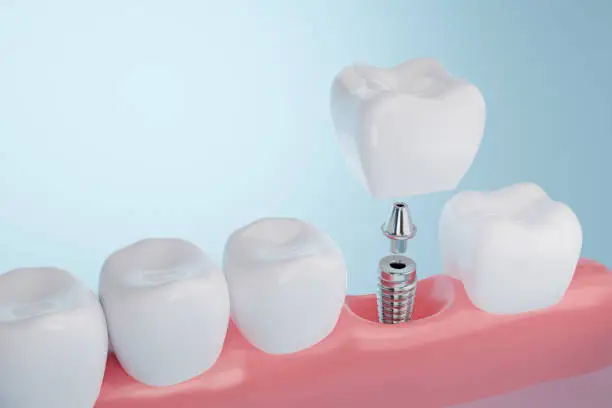If you dealing with missing teeth and looking for dental related treatment option, then dental implant can be a suitable solution. It is known for a top considering recommendation for replacing lost teeth but is the option are right fit for you ?
In this article, we will look into what dental implants are, their benefits and drawbacks, the costs involved, and factors to consider before making a decision.
What Are Dental Implants?
Dental implants are artificially designed tooth roots made to place in your jawbone and the implants are generally made of titanium that adjust correctly with your bone and helps to grow your bone tissue around implant. It is built to last long, gives you a strong, and smile that feels completely natural.
Benefits of Dental Implants
1. Long-Lasting and Durable: Unlike dentures or bridges require to replace them in every few years, the implants are made to survive a lifetime with proper care. It placed into your jawbone and creates stable base for tooth replacement
2. Improved Functionality: they work like a natural teeth. It surely makes you able to eat, speak, and smile. Not like dentures, they won’t slip or cause any discomfort and you can enjoy variety of foods without pain.
3. Preserve Jawbone Health: Traditional teeth replacement options like bridges can again lead to jawbone loss through the years. comparatively, dental implants help jawbone to stay healthy and preventing bone loss to maintain oral health. Additionally it helps your common facial structure.
4. Aesthetic Appeal: Implants look and feel is similarly like your natural teeth. It combines well with your existing teeth and gives you a natural look that improves your smile.
Disadvantage of Dental Implants
getting dental implants involves a few steps:
1. Consultation and Planning ( which takes 1-2 Weeks): Your dentist will surely take x-rays and scans to check oral health and your bone density. On the basis of check ups, they will see your medical history to make the futher plans for procedure.
2. Surgery (1-2 Hours per Implant): In surgical process the implants is been placed in your jawbone under anesthesia, the procedure of dental implant is generally simple but you can experience bit of swelling and discomfort after treatment.
3. Healing and Osseointegration (3-7 Months): This implants takes well time to attach with jawbone and this process is known as osseointegration. In this period you will may temporary restoration and advised to follow a specific recommend diet to improve healing.
4. Abutment and Crown (2-4 Weeks): Once implants is attached to the bone and get attached by a connector known an abutment. The restoration is completed by fabrication and placement of permanent crown over abutments.

Costs of Dental Implants
The cost of dental implants can change depending on several factors:
Number of Implants: it totally depends that how many implants are required, it will be costly if multiple implants are required. Single implants starts at around $4,000 per tooth.
Materials Used: High quality materials and advanced technology can influence the price of implants.
Dentist’s Fees: The fees charged by your dentist will affect the overall cost. It’s a good idea to discuss the pricing and payment options before starting treatment.
Key Considerations
1. Eligibility and Evaluation: all people are not suitable for dental implants, the strong status of your oral health, densite of bone and the medical history is important to identify that you are suitable candidate.
2. Customization: Our each dental implant treatment process is customized personally for the male and female.the type and size of the implant to the shape and color of the crown cloth and colours is customisable ensures a natural and comfortable fit.
3. Maintenance and Oral Hygiene: Dental implants doesn’t develop cavities, it maintains a good oral hygiene which is essential. Doing regular brushing, flossing and other dental check ups are important from preventing gum disease and ensures the longevity of your implants
4. Lifestyle Impact: make consider how the dental implants can fit into your lifestyle, they need a commitment for proper care and regular visits to maintain their functionality and appearance
Dental implants are a permanent for missing teeth, offering benefits such as improved function and jawbone support. If you stays in Liverpool or Blacktown and seek for a top dental services in sydney that provides decent comfort and discretion, so connecting with ‘yourfamilydentist’ could be the right choice for you. Our best dental implants in liverpool can offer you valuable investment for your smile and oral health. Also If you’re considering options in the area, visiting our dental clinic in Blacktown can provide you additional information and insights.
FAQs about Dental Implants
Dental implants are designed to be a permanent solution for missing teeth. With proper care and maintenance, they can last a lifetime. Your dentist will guide you on the best practices to ensure the longevity of your dental implants.
The dental implant procedure is generally well-tolerated by patients. Local anesthesia is used during the surgery to minimize discomfort. Some patients may experience minor discomfort or swelling after the procedure, but this typically decrease within a few days.
Dental implant placement usually requires multiple visits. The process involves an initial consultation, the surgical placement of the implant, and a period of healing before the final crown is attached. Your dentist will provide a timeline based on your specific needs.
If you don’t have sufficient jawbone density, your dentist may recommend a bone grafting procedure to build up the bone before placing the implant. In some cases, alternative treatments may be suggested if a bone graft is not suitable.
Caring for dental implants is similar to caring for natural teeth. Regular brushing, flossing, and dental check-ups are essential. Avoid using abrasive toothpaste or harsh chemicals, and follow your dentist’s instructions for optimal implant maintenance.
